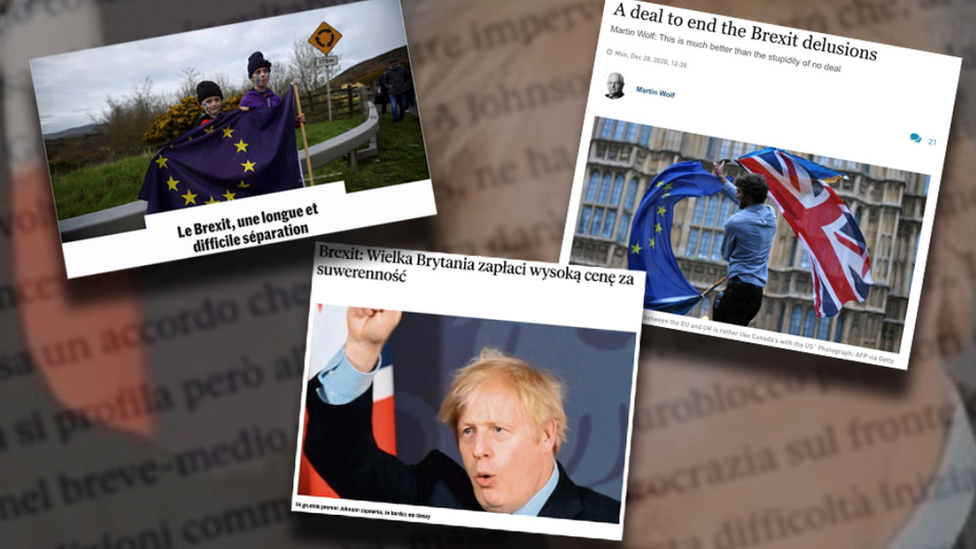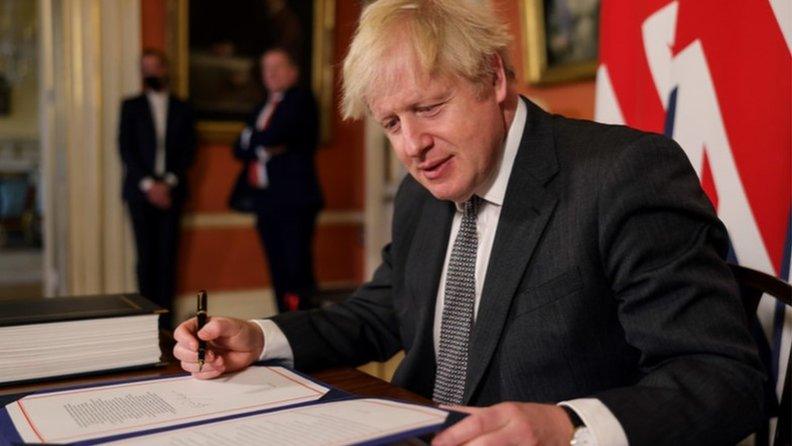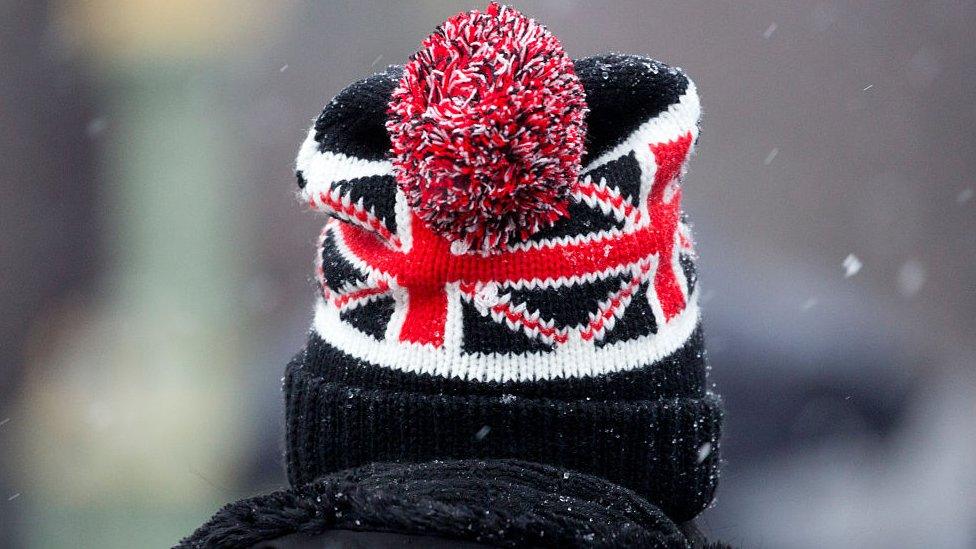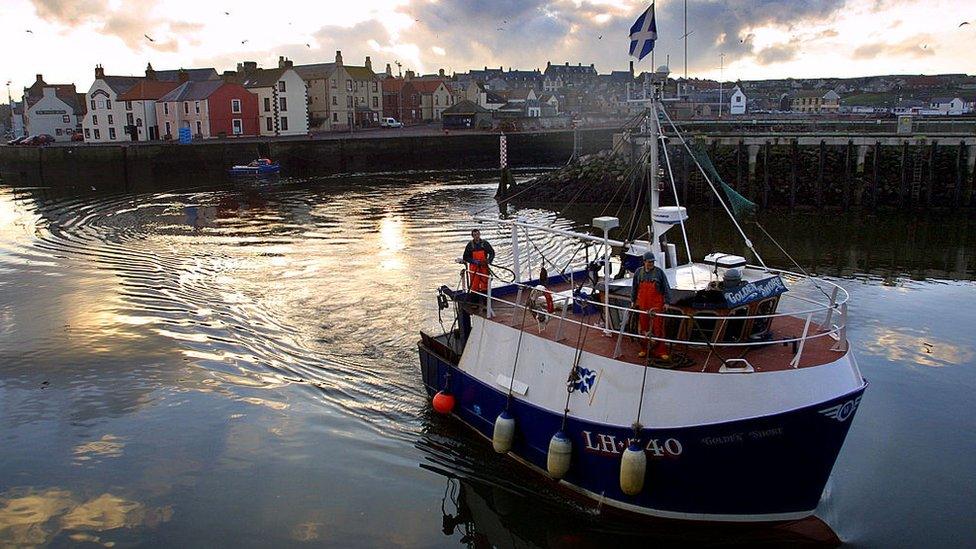Brexit: European press asks 'was it worth it?'
- Published

Newspapers around Europe are debating what lies ahead after the UK and the European Union agreed a post-Brexit trade deal.
Many commentators agree that Britain may have avoided the price hikes and disruption of no-deal, but they say it must still walk a trade tightrope to avoid further tariffs.
Arnaud de La Grange in France's centre-right Le Figaro newspaper says the UK must race to reach trade agreements with other countries. "For the UK, 2021 is the year of a leap into the unknown," he writes.
"[The] political price of the deal may prove to be much higher than the economic price, as the kingdom is tearing along its seams," Poland's conservative Rzeczpospolita paper says.
"Poland foresees not only further independence moves in Scotland but also the possible unification of Ireland," it adds.
Martin Wolf in The Irish Times writes that the deal "maintains a working relationship with the UK's close neighbours and principal economic partners". He adds that it brings the EU the benefit of being "able to move faster towards its shared objectives".
He says the UK made "difficult concessions, notably over the money it owed the EU, the border in Ireland, and EU demands for a level playing field".
Meanwhile, the Belgian analyst of European politics Hendrik Vos told the VRT public broadcaster: "If Britain wants to trade with the EU, its biggest export market, it will have to respect European regulations. They had to make an enormous concession there."
France's centre-left Le Monde accuses Britain of having "completely abandoned the City, the financial lung of the country", but it argues the deal marks a "sacred victory for Prime Minister Boris Johnson".

The basics
A Brexit deal has been agreed, days before a deadline. It means that the UK and the EU can continue to trade without extra taxes being put on goods.
What took so long? The UK voted to leave the EU in 2016 and actually left on 31 January 2020, but leaders had until the end of 2020 to work out a trade deal.
There are big changes ahead. Although it's a trade deal that has been agreed, there will also be changes to how people travel between the EU and UK, and to the way they live and work.

The UK government will no longer be able to use the EU as a "whipping boy" for its problems, Germany's centre-right Die Welt says. "The public can no longer be appeased with the ritual lie that the EU is responsible for all of life's misfortunes."
The issue of Gibraltar was expressly excluded from the agreement, and its future depends on negotiations between Spain and Britain.
Opinion writer Juan Casillas Bayo calls Gibraltar a "lost opportunity of Brexit" in an article in the ABC conservative daily, and warns of trouble ahead.
He accuses the Spanish foreign ministry of "weakness", and says neither Brexit nor strong backing for EU membership among residents there will bring an easy solution.
"Things will get worse before they get better," the Italian financial daily Il Sole 24 Ore says. It adds that the New Year will test the British "concept that whatever we lose by leaving the EU we gain in commercial deals with the rest of the world".
Few commentators have welcomed Britain's departure, although Hungary's left-liberal daily Nepszava says the EU "also wins with Brexit, as it has bade goodbye to a member-state that was constantly curling its lip at closer integration".
"The way a European nation stubbornly turned its back on the European idea and common future still hurts after all those crazy Brexit years," Germany's left-liberal Der Spiegel magazine says.
The liberal Polish daily Gazeta Wyborcza says the EU emerges "weaker" from Brexit, but "at least it allows relations to normalise and, when the dust settles, the EU will not have an enemy at its back but a relatively friendly and... solvent neighbour".
But some commentators say lessons can be learned from the UK's approach during its membership of the bloc.
"EU leaders have learned nothing from Brexit… that it is dangerous to push centralisation too far and trample on sovereignty," the Magyar Hirlap daily, which reflects the views of Hungary's Eurosceptic government, says.
Jean-Marc Vittori told France Inter radio that Brexit "could be a tremendous opportunity for Europe, provided we know how to take advantage of it".
The Dutch Algemeen Dagblad sees the deal as a successful exercise in "damage limitation". "Not a single country signed up to exit in Britain's wake, and British attempts to negotiate with countries separately and thus divide the EU failed," it says.
And Italy's Il Post agrees that the EU "managed to remain united… and staunchly defended a small member state, Ireland".
"The domino effect that some predicted in 2016 didn't materialise: quite the opposite - the consensus in favour of European institutions has grown," it says.


Related topics
- Published30 December 2020

- Published30 December 2020

- Published29 December 2020
